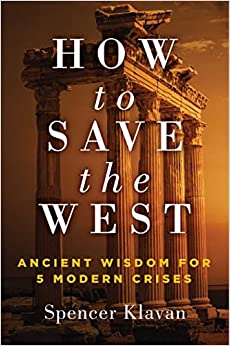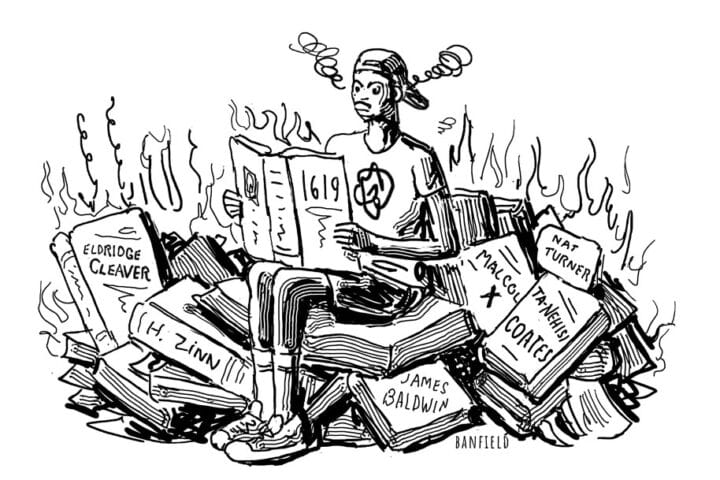Books Reviewed
Conservatives love little more than to lament the death of the West. Each year brings new books on the subject, almost all soon forgotten. A handful endure: Oswald Spengler’s Decline of the West (1923) comes to mind, as does Jacques Barzun’s From Dawn To Decadence (2000), and now, I’d wager, Spencer Klavan’s How To Save The West. The associate editor of this journal, as well as the features editor for The American Mind and host of the Young Heretics podcast, Klavan might well outperform those two predecessors in educating and edifying the public. Unlike the sometimes inscrutable Spengler, Klavan writes in clear and eloquent prose, and unlike the venerable Barzun, he confines his vision of civilizational collapse to just a couple hundred pages. Best of all for an anxious modern audience, the author illuminates a path forward in our rapidly darkening times.
Klavan identifies five key modern crises: of reality, body, meaning, religion, and regime. As technological wizards such as Mark Zuckerberg threaten to wrest us from the real world and thrust our minds into a “metaverse” of their own imaginations, we begin to wonder whether objective reality—“truth independent of authority, including the authority of ‘experts’ and of majority opinion”—even exists.
The virtual realities in which we now spend so much of our time exacerbate a long-festering sense of duality between our bodies and souls. Schizophrenic cultural elites compound the confusion with a pop ontology vacillating between materialism and gnosticism. They dispel our faith, hope, love, dreams, and moral intuitions with the scientific assurance that we are nothing more than atoms. Yet at the same time they belittle our bodies as relics of an ignorant age and urge us to transcend the physical world through fads such as transgenderism. If our bodies do not matter, then what do our perceptions mean? If only our bodies matter, how can anything mean anything at all?
This crisis of meaning leads us to question the very basics of human motivation: why do we think what we think, love what we love, and do what we do? Happily, on this problem, ancients and moderns seem to have reached the same conclusion: imitation. Thinkers as distinct as Plato, René Girard, and Richard Dawkins “agree that replication—the endless copying and reproduction of things—is a fundamental mechanism of the universe that governs everything from cells to empathy to human culture.” But what, if anything, governs that process of replication? What, if anything, are we ultimately replicating?
***
Klavan does not shrink, as do so many muddle-headed modern gurus, from the essential question: “All the good and noble things we want to fight for,” he explains, “can’t exist unless God does.” Modern materialists have attempted to avoid the logical necessity of God’s existence by concocting scientific theories based on pure imagination. The “multiverse,” a popular theory that posits multiple or infinite worlds, seems to fill the gap left by presuming God away. But there is nothing new under the sun in our singular cosmos, as Klavan reminds his readers by quoting Saint Thomas Aquinas, who considered and refuted the notion of the multiverse in the Summa Theologiae more than four centuries before modern scientists flattered themselves into thinking that they had stumbled onto a novel idea.
Within the universe, we live in a particular place. The West, contrary to modern platitudes, is not just an idea; it is also a political community. The first four crises through which Klavan guides us culminate in a crisis of regime, though we cannot seem to agree on the cause. “Either our democracy is threatened by right-wing extremists who must be prosecuted—if not persecuted—with the full powers of the federal government,” he observes, “or our society is melting down under the corrosive assaults of neo-Marxism, Critical Race Theory, and gender extremism.” Neither can we agree about how to solve the problem: “Perhaps the solution is secession or localism, or perhaps it requires a massive extension of federal power, and more governors ruling by emergency decree as they did during the COVID crisis.”
***
Klavan views the crisis of regime through the lens of various political philosophers including Plato, Polybius, Machiavelli, Thomas Hobbes, John Locke, John Stuart Mill, Karl Marx, Rudi Dutschke, and Patrick Deneen. But he doesn’t abandon his reader to dry intellectual history. He recognizes that regimes survive on more than mere ideas. “In the end,” he concludes, “it is philia—friendship, or love—that binds political communities together.” We find this ancient wisdom in the writing of Aristotle but also closer to home in the public addresses of George Washington, Abraham Lincoln, and Theodore Roosevelt. The West is no mere abstraction, and neither will be its salvation. We are real people living in a real world, the author reminds us, and we can choose to live as if the truths and triumphs of our once-great civilization are real, too.
Klavan distinguishes himself not only by his wealth of knowledge and wisdom but also by his lack of pomp and pedantry. He quotes everyone from Herodotus to Kendrick Lamar, translating the texts himself—except in the case of Lamar, whom he regrettably leaves in the original—and yet this superb scholarly display might well pass unnoticed because he never shows off. Every line propels this beautiful, urgent book toward its purpose. The civilization is in crisis, people need answers, and How to Save the West provides them.





